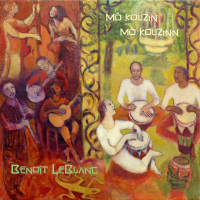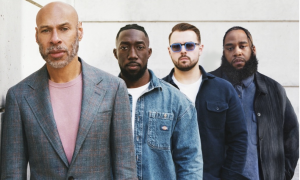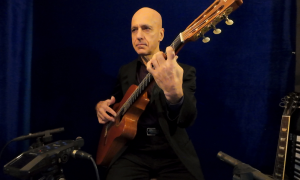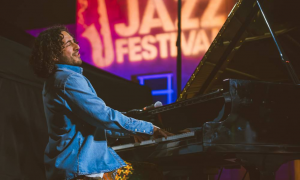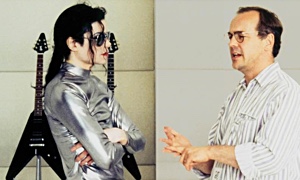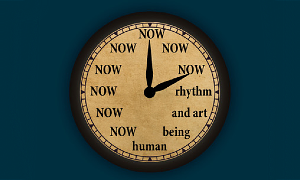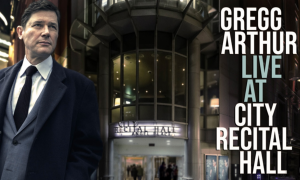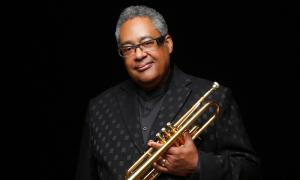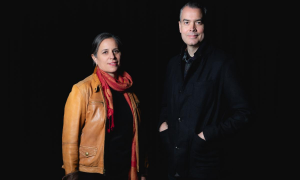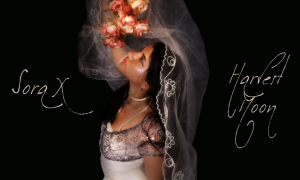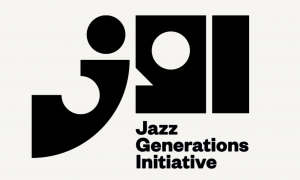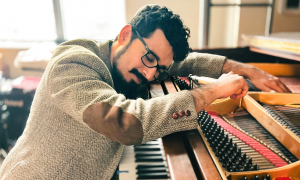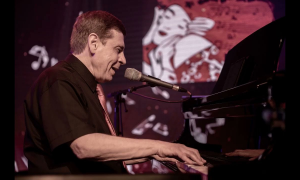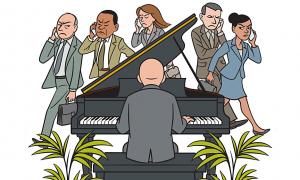By Steve Provizer
Props to @JoshSinton for asking the question: “When did jazz musicians stop emulating singers and begin to emulate other instrumentalists?" It calls for more than a 140 character response...
The short answer is that they never stopped. It's an admixture and always has been.
Look at the popular music strains in America as they led to 20th century jazz. First, the vocal lineage. You're talking about minstrelsy, formal spiritual choruses with solos, theatre music, indigenous 'ethnic' folks songs, blues, shouts and 'parlor' singing, a la Stephen Foster. On the instrumental end, you had the banjo, guitar and piano accompaniment for that music. Then you had brass bands, pit bands, concert bands, plus the whole line of virtuoso pre-rag and ragtime pianists, as well as other instrumentalists whose enduring reputations bespeak a technical ability that clearly surpassed the norm.
For the sake of having to start somewhere, let's choose Buddy Bolden as the first (non pianistic) jazz exemplar of our premise. If I try to imagine myself back in that uncharted musical territory, standing in Bolden's shoes. it seems to me that the variations I played would be based on what I'd heard vocalists do, what I'd heard cornet or other (single-line) instrumentalists do and what the trumpet in my hands wanted me to do-what its technical parameters were.
From descriptions of his playing-and listening to the style of those who learned from him-Bunk Johnson, Freddie Keppard-what Bolden played was clearly elaborations on the blues and you know what? To this day, that's what horn players starting out continue to do.
The world ain't the same as it was then. The resources for anyone who would learn to improvise are like the difference between hitchhiking and climbing on the Space Shuttle. But were the decisions that Buddy Bolden had to make really that much different than the decisions anyone picking up the horn has to make right now-100 years later? We hear singers, we hear virtuoso instrumentalists. The instruments we play imprint themselves and create tendencies of interaction.
The human voice, for most of us, still has a compelling quality-and jazz pays homage to that through the truism that you can't play a ballad if you don't know the words.
Props to @
The short answer is that they never stopped. It's an admixture and always has been.
Look at the popular music strains in America as they led to 20th century jazz. First, the vocal lineage. You're talking about minstrelsy, formal spiritual choruses with solos, theatre music, indigenous 'ethnic' folks songs, blues, shouts and 'parlor' singing, a la Stephen Foster. On the instrumental end, you had the banjo, guitar and piano accompaniment for that music. Then you had brass bands, pit bands, concert bands, plus the whole line of virtuoso pre-rag and ragtime pianists, as well as other instrumentalists whose enduring reputations bespeak a technical ability that clearly surpassed the norm.
For the sake of having to start somewhere, let's choose Buddy Bolden as the first (non pianistic) jazz exemplar of our premise. If I try to imagine myself back in that uncharted musical territory, standing in Bolden's shoes. it seems to me that the variations I played would be based on what I'd heard vocalists do, what I'd heard cornet or other (single-line) instrumentalists do and what the trumpet in my hands wanted me to do-what its technical parameters were.
From descriptions of his playing-and listening to the style of those who learned from him-Bunk Johnson, Freddie Keppard-what Bolden played was clearly elaborations on the blues and you know what? To this day, that's what horn players starting out continue to do.
The world ain't the same as it was then. The resources for anyone who would learn to improvise are like the difference between hitchhiking and climbing on the Space Shuttle. But were the decisions that Buddy Bolden had to make really that much different than the decisions anyone picking up the horn has to make right now-100 years later? We hear singers, we hear virtuoso instrumentalists. The instruments we play imprint themselves and create tendencies of interaction.
The human voice, for most of us, still has a compelling quality-and jazz pays homage to that through the truism that you can't play a ballad if you don't know the words.








